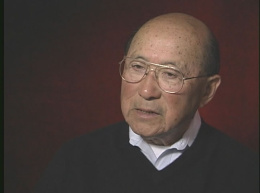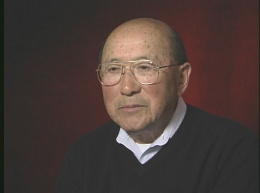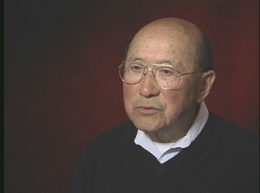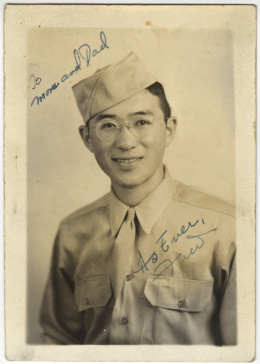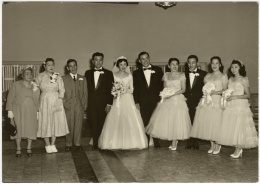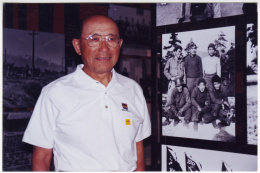Fred Shiosaki
| Name | Fred Shiosaki |
|---|---|
| Born | August 23 1924 |
| Died | April 10 2021 |
| Birth Location | Spokane, Washington |
| Generational Identifier |
A decorated World War II veteran and member of the 442nd Regimental Combat Team , Fred Shiosaki (1924–2021) became the founding director of the Spokane Air Pollution Control Authority and later the head of the environmental program at Washington Water and Power Company.
Early Life in Spokane
Fred Akira Shiosaki was born on August 23, 1924, in Spokane, Washington, the fourth of five children of Kisaburo and Tori Shiosaki. Kisaburo was from Shizuoka Prefecture and first migrated to Vancouver, Canada, at age twenty-one in 1904 to work on the Canadian Pacific Railroad. After eventually crossing the border into Washington, he worked as a cook in Spokane, before landing a job as a busboy at the posh Davenport Hotel upon its opening in 1914. He subsequently returned to Japan to marry Tori, who was fifteen years his junior and from a neighboring village. The couple eventually settled in the Hillyard section of Spokane and ran a laundry, with the family living in a flat upstairs. Their five children were born between 1917 and 1927, and each helped out at the laundry. The family became well-known in town, and the laundry flourished, the soiled clothing of railroad and other industrial workers insuring a steady stream of business. [1]
Young Fred grew up amidst German, Italian, and Scandinavian immigrant families, along with a few other Japanese. Like many Nisei, he played baseball, swam, and rode bikes with his white friends on the one hand, while going to Japanese language school and speaking Japanese at home with his family. While his older brothers were top students—George, the eldest, was the salutatorian at John R. Rogers High School in 1935—Fred was a mostly indifferent one. At Rogers, he was active in the camera club and was on the track team. He was a senior in high school when international events would change his life. [2]
World War II and Military Service
After the Japanese attack on Pearl Harbor , business at the family laundry initially fell, but gradually built back up, since the Shiosakis proved to be the only ones who were able to handle the heavily soiled work clothing generated by local industries. Though Japanese Americans in the area faced curfews, were prohibited from going to certain parts of town, and needed a permit to travel more than ten miles from home, they were not forcibly removed, since they were in the eastern part of the state in what the Western Defense Command defined as "Military Area No. 2." The presence of Japanese Americans in Spokane actually grew in early 1942, as Japanese Americans from the western part of the state migrated there to avoid being forcibly removed to concentration camps. [3]
Shiosaki continued uneasily at Rogers High. At one point, he recalled being confronted by the FBI when a local resident spotted him taking pictures of the campus for the school yearbook. He graduated from Rogers in June of 1942 and worked as a firefighter for the U.S. Forest Service in Idaho that summer. He tried to enlist in the army when he turned eighteen in August, but as a Nisei, was classified as 4-C (enemy alien) and turned down. Meanwhile, his brother Roy, three years his senior and who had been running a laundry that their father bought in Montana, had been drafted in February 1942 before the ban on Nisei in the military had gone into effect. Eldest brother George had gone to Japan to continue his studies upon graduating from Rogers and was still there, the family having no idea of his whereabouts or status. In the fall, Fred enrolled at nearby Gonzaga University, but struggled with his studies in a tense environment. When the Military Intelligence Service put out a call for Nisei linguists that fall, Fred tried to volunteer but was again turned down, this time because his Japanese was not good enough. [4]
Finally, in the spring of 1943, with the announcement of the segregated 442nd Regimental Combat Team, a path to enlistment for Fred emerged, and he signed up, with his induction deferred until the end of the school year. Officially enlisted in August 1943, he reported to Fort Douglas, Utah, then was sent home for a few weeks before joining the 442nd at Camp Shelby, Mississippi, later in the fall. He arrived there at about the same time as Japanese Americans who volunteered from American concentration camps and wondered if he would have volunteered under those circumstances. He also learned to get along with the many Japanese Americans from Hawai'i and even learned some pidgin English so as to blend in with them. By the time he shipped out with the rest of the 442nd in May of 1944, he had been assigned to K Company of the Third Battalion and had acquired the nickname of "Rosie," due to his fair complexion and rosy cheeks. [5]
Shiosaki saw combat in Italy, France, then Italy again from his arrival in Anzio in June 1944 until the end of the European war in May 1945. Trained as a rifleman at Camp Shelby, he ended up assigned to the mortar section for most of his time in combat. Among the many battles he took part in was the famed rescue of the "Lost Battalion" at the end of October 1945 where his K Company was among the units that took the brunt of German fire. During this attack, he was hit by shrapnel in the abdomen, but was not seriously wounded and was able to continue. He was one of just seventeen men out of 180 in Company K who were able to fight afterwards. At the end of European War, he processed German POWs at Ghedi Airfield near Milan. He was back home in Spokane by the first days of 1946. He was awarded a Bronze Star and Purple Heart among other decorations. [6]
Postwar Life and Career
Back home, Shiosaki re-enrolled at Gonzaga, where he struggled with his concentration during the first year, beset by recurring nightmares and other lingering effects of war. He eventually graduated with a degree in chemistry in 1949. In the meantime, he met Lily Nakai, a young Nisei woman also from Spokane, and the couple began seriously dating. Shiosaki began graduate studies at the University of Washington, but quit after a year. Unable to find a commensurate job, he returned to Gonzaga to get a teaching certificate and student-taught chemistry, but decided it was not for him. Finally, through a professor at Gonzaga, he found a job with a pharmaceutical firm, Hollister-Stier Laboratories, in Spokane in 1953–54, and he and Lily married in 1955. The couple eventually had a son and a daughter. Meanwhile, his parents decided to become naturalized U.S. citizens. The family also learned the fate of eldest brother George. Forcibly conscripted into the Japanese military, he survived the war, had lost his U.S. citizenship and ended up marring a Japanese woman and raising a family in Japan. Eventually regaining his citizenship, he was able to see Kisaburo again before the latter's passing in 1958. Roy—who was one of the few Japanese Americans to see combat in Europe outside of the 442nd, having ended up in a New York National Guard unit—took over the family laundry and ran it into the 1990s. [7]
Fred ended up working for the government for most of his career as a chemist for the City of Spokane initially, then as the founding director of the Spokane Air Pollution Control Authority in 1967. In 1978, he took over the environmental program at Washington Water and Power Company and later became the chairman of the Washington State Ecological Commission. Governor Gary Locke appointed him to the Washington Fish and Wildlife Commission in 1999. He played a key role in the construction of a new Fish and Wildlife Department regional headquarters in Spokane, and the complex was eventually named after him. In later life, he and Lily took regular trips to Hawai'i, where he reunited with buddies from K Company. He also enjoyed gardening and fly fishing. Lily passed away in 2016. Fred moved to a retirement home in Seattle in his last years and passed away on April 10, 2021, at the age of 96. [8]
For More Information
Brown, Daniel James. Facing the Mountain: A True Story of Japanese American Heroes in World War II . New York: Viking, 2021.
Hughes, John C. "Fred Shiosaki: The Rescue of the Lost Battalion," Olympia: Legacy Washington, Office of Secretary of State, 2015.
Shiosaki, Fred. Interview by Tom Ikeda , Spokane, Washington, Apr. 26–27, 2006, Densho Visual History Collection, Densho Digital Repository.
Footnotes
- ↑ Fred Shiosaki Interview by Tom Ikeda, Spokane, Washington, Apr. 26–27, 2006, Segements 1–3, Densho Visual History Collection, Densho Digital Repository, https://ddr.densho.org/media/ddr-densho-1000/ddr-densho-1000-190-transcript-f146cb4c46.htm ; John C. Hughes, "Fred Shiosaki: The Rescue of the Lost Battalion" (Olympia: Legacy Washington, Office of Secretary of State, 2015), 5–7, http://finditconsumer.wa.gov/legacy/washington-remembers/stories/fred-shiosaki/pdf/shiosaki-pdf.pdf ; Daniel James Brown, Facing the Mountain: A True Story of Japanese American Heroes in World War II (New York: Viking, 2021), 43–44. Shiosaki gives his birthdate as August 23 in his Densho interview, but it is listed as August 22 in the state birth registry. See Fred Akira Shiosaki, Washington, County Birth Registers, 1873–1965, accessed on Jan. 16, 2021 at https://www.familysearch.org/ark:/61903/1:1:63D2-YX2M .
- ↑ Shiosaki Interview, Segments 4–9; Hughes, "Fred Shiosaki," 6–8.
- ↑ Shiosaki Interview, Segments 11–12, 14.
- ↑ Shiosaki Interview, Segments 10, 13 and 15; Brown, Facing the Mountain , 117–18; Hughes, "Fred Shiosaki," 7–8.
- ↑ Shiosaki Interview, Segments 17–22; Hughes, "Fred Shiosaki," 21–22; Fred A. Shiosaki, United States World War II Army Enlistment Records, 1938-1946, accessed on Jan. 16, 2021 at https://www.familysearch.org/ark:/61903/1:1:K85Z-MGG .
- ↑ Brown, Facing the Mountain , 236–39, 262–63, 320, 336, 346, 351, 359, 368, 402, 446; Hughes, "Fred Shiosaki," 3, 23–33.
- ↑ Shiosaki Interview, Segments 19, 43–46; Hughes, "Fred Shiosaki," 34–35; Brown, Facing the Mountain , 463–65.
- ↑ Hughes, "Fred Shiosaki," 35–39; Facing the Mountain , 464–65; Shiosaki Interview, Segments 47–48; Fred A. Shiosaki obituary, The Seattle Times , Apr. 14, 2021, accessed on April 15, 2021 at https://obituaries.seattletimes.com/obituary/fred-shiosaki-1082054438 .
Last updated Jan. 16, 2024, 1:08 a.m..

 Media
Media
